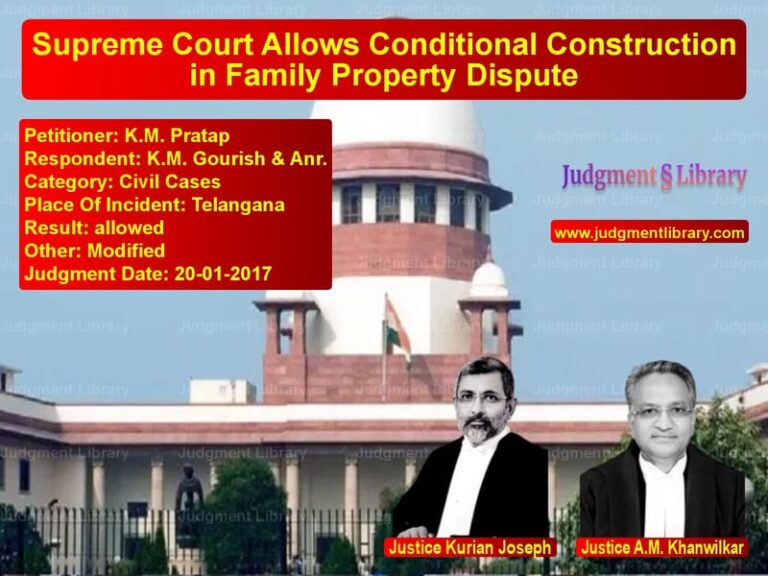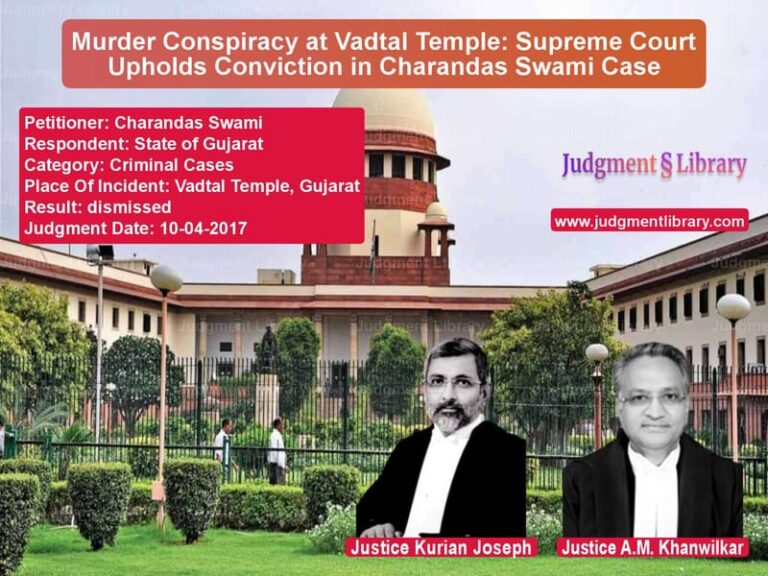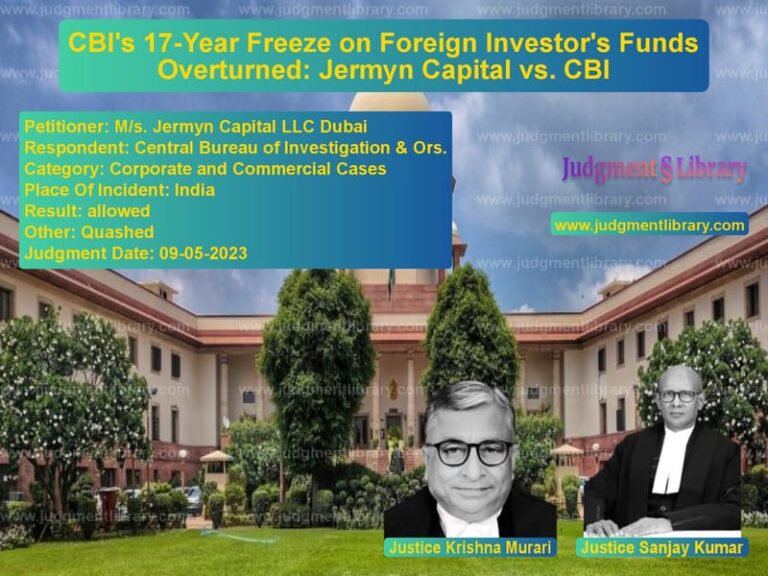Supreme Court Upholds MCOCA Charges in Mumbai Matka Gambling Case
The Supreme Court of India, in Zakir Abdul Mirajkar v. The State of Maharashtra & Ors., delivered a landmark judgment regarding the invocation of the Maharashtra Control of Organized Crime Act, 1999 (MCOCA) in a gambling-related case. The case centered around an alleged organized crime syndicate that manipulated the Mumbai Matka gambling system to defraud the public.
Background of the Case
The prosecution alleged that the appellants were part of an organized crime syndicate operating the Mumbai Matka, a form of gambling where bets are placed on numbers or playing cards. The organizers were accused of manipulating the draw to ensure minimal payouts and maximum profits. The prosecution further claimed that the illegal proceeds from this gambling network were used to finance criminal activities and underworld operations.
The alleged kingpin of the syndicate was Salim Mulla, who, according to the prosecution, used various intermediaries to manage and distribute the gambling proceeds. The involvement of multiple individuals in a hierarchical structure led the authorities to invoke MCOCA against the accused.
Petitioner’s Arguments
The petitioners, including Zakir Abdul Mirajkar and others, challenged the invocation of MCOCA on the following grounds:
- Gambling by itself does not constitute an organized crime under MCOCA.
- The prosecution failed to demonstrate that the accused were part of an organized crime syndicate.
- More than one charge-sheet was not filed against each individual accused, which is a prerequisite for invoking MCOCA.
- The confessions used against the accused were recorded by Additional Superintendents of Police (Addl. SPs) rather than by Superintendents of Police (SPs), making them inadmissible.
- The investigation was not conducted in accordance with MCOCA’s stringent requirements.
Respondents’ Arguments
The State of Maharashtra opposed the appeal and presented the following arguments:
- Although gambling is not necessarily an organized crime, in this case, the proceeds were used to fund criminal gangs, justifying the application of MCOCA.
- The accused were part of a structured network with defined roles, fulfilling the definition of an organized crime syndicate.
- MCOCA applies to an entire syndicate, and it is not necessary for each member to have multiple charge-sheets filed against them individually.
- Confessions were recorded by police officers who were equivalent in rank to an SP, making them valid under MCOCA.
- The investigation was conducted within the framework of MCOCA, and all legal safeguards were followed.
Supreme Court’s Key Observations
After reviewing the case, the Supreme Court made the following key observations:
- MCOCA can be invoked against individuals involved in a structured criminal network, even if their direct involvement in violent crimes is not proven.
- The definition of an organized crime syndicate under MCOCA does not require each individual to have multiple prior charge-sheets; rather, it requires the syndicate itself to have been involved in repeated unlawful activities.
- The purpose of MCOCA is to curb organized crime in all its forms, including financial crimes that fund larger criminal activities.
- Confessions recorded by Addl. SPs are admissible if the officer is of equivalent rank to an SP. The Court held that Addl. SPs in Maharashtra Police are of the same rank as SPs and thus authorized to record confessions under MCOCA.
- The procedural safeguards under MCOCA, including obtaining approvals and sanctions for prosecution, were followed.
Supreme Court’s Judgment
The Supreme Court dismissed the appeals and upheld the charges under MCOCA. The key directives included:
- The confessions recorded by Addl. SPs were deemed valid.
- The invocation of MCOCA was justified, given the structured nature of the crime syndicate.
- The petitioners were directed to approach the High Court if they wished to seek bail.
- The evidentiary value of confessions would be assessed by the trial court at the appropriate stage.
Impact of the Judgment
This ruling has significant implications for criminal jurisprudence in India:
- Expanding the Scope of MCOCA: The judgment clarifies that organized financial crimes can fall under MCOCA if they are linked to criminal syndicates.
- Validation of Confessions: The decision establishes that confessions recorded by Addl. SPs can be admissible under MCOCA.
- Strengthening Prosecution in Organized Crime Cases: Law enforcement agencies have greater clarity on how to establish the existence of an organized crime syndicate.
- Fair Trial Protections: The Court reiterated that procedural safeguards under MCOCA must be strictly followed to ensure fair trials.
Conclusion
The Supreme Court’s judgment in Zakir Abdul Mirajkar v. The State of Maharashtra & Ors. sets a precedent in tackling organized financial crimes under MCOCA. By emphasizing the necessity of structured investigations and validating the role of Addl. SPs in recording confessions, the ruling strengthens India’s legal framework against organized crime.
Going forward, this decision will serve as a benchmark for similar cases, ensuring that organized syndicates engaging in financial crimes are effectively prosecuted under the law.
Petitioner Name: Zakir Abdul Mirajkar.Respondent Name: The State of Maharashtra & Ors..Judgment By: Justice Dhananjaya Y Chandrachud, Justice Surya Kant.Place Of Incident: Maharashtra.Judgment Date: 24-08-2022.
Don’t miss out on the full details! Download the complete judgment in PDF format below and gain valuable insights instantly!
Download Judgment: zakir-abdul-mirajkar-vs-the-state-of-maharas-supreme-court-of-india-judgment-dated-24-08-2022.pdf
Directly Download Judgment: Directly download this Judgment
See all petitions in Money Laundering Cases
See all petitions in Fraud and Forgery
See all petitions in Extortion and Blackmail
See all petitions in Judgment by Dhananjaya Y Chandrachud
See all petitions in Judgment by Surya Kant
See all petitions in dismissed
See all petitions in supreme court of India judgments August 2022
See all petitions in 2022 judgments
See all posts in Criminal Cases Category
See all allowed petitions in Criminal Cases Category
See all Dismissed petitions in Criminal Cases Category
See all partially allowed petitions in Criminal Cases Category







